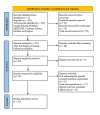Advancements in the Management of Pediatric and Adult Inflammatory Bowel Disease: A Systematic Review of Treatment Strategies and Long-Term Outcomes
- PMID: 39583371
- PMCID: PMC11585480
- DOI: 10.7759/cureus.72324
Advancements in the Management of Pediatric and Adult Inflammatory Bowel Disease: A Systematic Review of Treatment Strategies and Long-Term Outcomes
Abstract
Inflammatory bowel disease (IBD), including Crohn's disease and ulcerative colitis (UC), remains a clinically complex condition in children and adults. This study is a systematic analysis of key developments in the treatment of inflammatory bowel diseases, as well as their efficacy and safety over time. Early diagnosis of pediatric IBD is very important since it affects growth and development in children. New therapeutic approaches like biological agents, small molecules, and gene or targeted drugs have given the medical fraternity new treatment protocols. There is a trend towards more selective therapies for adult IBD, especially for anti-tumor necrosis factor (anti-TNF) biologics, integrin antagonists, and interleukin-12/23 (IL-12/23) inhibitors. This review emphasizes the need for patient management where early intervention leading to mucosal healing has been identified to predict durable outcomes. Systematic analysis of existing literature comparing childhood and adult populations shows that morbidity, pathophysiology, therapeutic outcome, as well as the potential for adverse outcomes are dissimilar, which supports the need for differentiated therapy. This work also looks at long-term consequences of the intervention course, the avoidance of surgery, and an improvement in the quality and stability of life as well as reduction in further development of malignant transformation. The new developing strategy of gut microbiome modification and nutrition support for maintaining remission is also argued. Despite these progresses, issues still persist concerning the effectiveness of treatments, side effects, and patients' compliance. These recommendations give this review a prospective outlook of treatment regimens likely to define the future of IBD management for all age groups.
Keywords: adult ibd; biologic therapies; crohn’s disease; inflammatory bowel disease; long-term outcomes; pediatric ibd; personalised medicine; small molecules; treatment outcomes; ulcerative colitis.
Copyright © 2024, Adedara et al.
Conflict of interest statement
Conflicts of interest: In compliance with the ICMJE uniform disclosure form, all authors declare the following: Payment/services info: All authors have declared that no financial support was received from any organization for the submitted work. Financial relationships: All authors have declared that they have no financial relationships at present or within the previous three years with any organizations that might have an interest in the submitted work. Other relationships: All authors have declared that there are no other relationships or activities that could appear to have influenced the submitted work.
Figures
References
-
- McDowell C, Farooq U, Haseeb M. Florida: StatPearls Treasure Islands; 2023. Inflammatory Bowel Disease. - PubMed
-
- Inflammatory bowel disease: clinical aspects and treatments. Fakhoury M, Negrulj R, Mooranian A, Al-Salami H. https://doi.org/10.2147/jir.s65979. J Inflamm Res. 2014;7:113–120. - PMC - PubMed
-
- Inflammatory bowel disease: emerging therapies and future treatment strategies. Bretto E, Ribaldone DG, Caviglia GP, Saracco GM, Bugianesi E, Frara S. https://doi.org/10.3390/biomedicines11082249. Biomedicines. 2023;11:2249. - PMC - PubMed
-
- Exploring the pipeline of novel therapies for inflammatory bowel disease: state of the art review. Zurba Y, Gros B, Shehab M. https://doi.org/10.3390/biomedicines11030747. Biomedicines. 2023;11:747. - PMC - PubMed
Publication types
LinkOut - more resources
Full Text Sources

